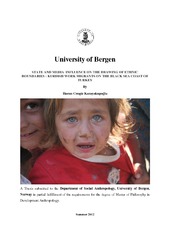State and media influence on the drawing of ethnic boundaries : kurdish work migrants on the Black Sea coast of Turkey
Master thesis
Permanent lenke
https://hdl.handle.net/1956/6372Utgivelsesdato
2012-07-30Metadata
Vis full innførselSamlinger
Sammendrag
In the Turkish Black Sea Region Kurdish agricultural workers and other ethnic groups interact and form relations. This study is focused on the effects of ethnic difference in the formation of these relations, groups' perception of each other and the issues that emerge out of these perceptions. Within the frame of this focus, this study problematizes the following matters: Do economic (advantageous or disadvantageous), social, ethnic parameters created by the ethnic difference between the groups form a threshold value? Do these threshold values get shaped by the discourses of state and media as well as economic, social, ethnic variables? Do these threshold values completely determine the relations and perceptions between Kurdish workers and the local public? Barth's general approach assumes that the shaping of the relations between two ethnic groups and the borders that emerge between them accordingly are products of the interaction between the groups. Therefore he states that these borders are solely built on an interactional basis. This research was prepared with the intention of emphasizing different mechanisms in the definition of borders between groups and it stands in opposition with Barth's argument. These mechanisms were designed to demonstrate that groups' perception of each other, content of their relations, and the borders between them are vulnerable to the effects of state and media. The main part of this research aims to demonstrate the effects of state and media formations which Barth has left blank while defining the emergence of the borders between ethnic groups.
